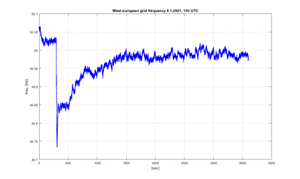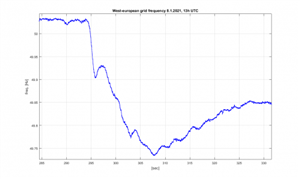On Jan.8, 13:04:54 UTC, the european grid frequency dropped from 50.0269Hz to a minimum of 49.7343Hz 13.4sec later, see fig 1 below, plot starting at 13:00, x-axis in sec. .
As a result southeast Europe was split from the rest, the frontier crossing the Balkan countries, see
https://www.entsoe.eu/news/2021/01/15/system-separation-in-the-continental-europe-synchronous-area-on-8-january-2021-update/
At 13:42:35 the western frequency was back at the 50Hz level, some time later they managed to resync the east and reconnected. Reasons are still under examination. A high western demand faced a southeastern production, so after the split the western frequency went down, the eastern frequency went up.
At 79/50 sec. after the event the primary control kicked in at 49.9035Hz and brought it up again to 49.9308 but eventually failed, see fig 2. below.
In the 13. hour that day they failed to deliver 112 sinewaves. Now ENTSO-E has to decide: readjust the wall clocks in Berlin or Athens? )
Reportedly at a frequency below 49.8Hz big loads, like pumps for reservoirs or industrial customers are switched off automatically.
In 2011 the German Government launched a scenario for a blackout, detailed as a script:
https://www.tab-beim-bundestag.de/en/publications/books/petermann-etal-2011-141.html
Clive
 c
c
